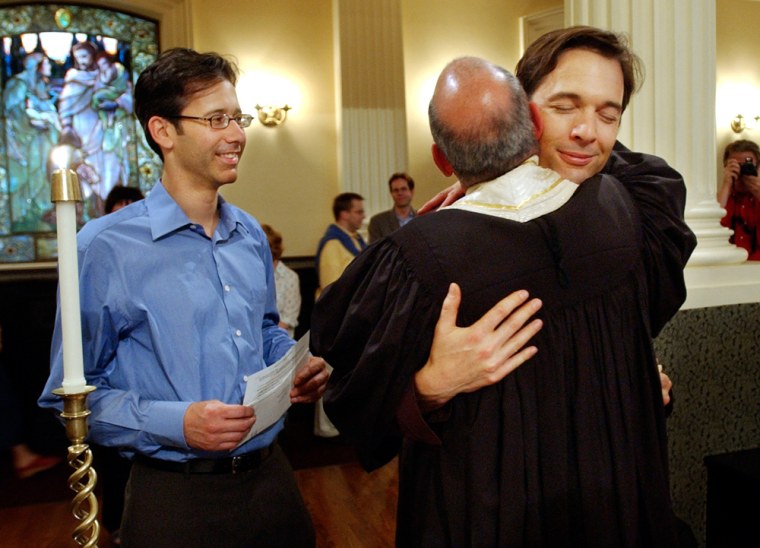The Supreme Court sidestepped a dispute over gay marriage on Monday, rejecting a challenge by conservative groups to the status of Massachusetts as the only state that sanctions same-sex marriages.
Justices had been asked to overturn a year-old decision by the Massachusetts high court that legalized gay marriage. They declined, without comment.
In the past year, at least 3,000 gay Massachusetts couples have wed, although voters may have a chance next year to change the state Constitution to permit civil union benefits to same-sex couples, but not the institution of marriage.
Critics of the November 2003 ruling by the highest court in Massachusetts argue that it violated the U.S. Constitution's guarantee of a republican form of government in each state. They lost at the 1st U.S. Circuit Court of Appeals in Boston.
Foes sought ‘protection’ from state court
Their attorney, Mathew Staver, said in a Supreme Court filing that the Constitution should "protect the citizens of Massachusetts from their own state Supreme Court's usurpation of power."
Federal courts, he said, should defend people's right "to live in a republican form of government free from tyranny, whether that comes at the barrel of a gun or by the decree of a court."
Merita Hopkins, a city attorney in Boston, had told justices in court papers that the people who filed the suit have not shown they suffered an injury and could not bring a challenge to the Supreme Court. "Deeply felt interest in the outcome of a case does not constitute an actual injury," she said.
Massachusetts Attorney General Tom Reilly told justices that voters can overrule the Supreme Court by adopting a constitutional amendment if they so wish.
The lawsuit was filed by the Florida-based Liberty Counsel on behalf of Robert Largess, the vice president of the Catholic Action League, and 11 state lawmakers.
Group won review of Ten Commandments case
The conservative law group had persuaded the Supreme Court in October to consider another high profile issue, the constitutionality of Ten Commandments displays on government property. The court agreed to look at that church-state issue before Chief Justice William Rehnquist was diagnosed with thyroid cancer.
He is working from home while receiving chemotherapy and radiation and will miss court sessions for the next two weeks.
State legislators will decide whether to put the issue before Massachusetts voters in November 2006. Voters in 11 states approved constitutional amendments banning gay marriage in November elections. President Bush has promised to make a federal anti-gay marriage amendment a priority of his second term.
The Massachusetts Supreme Judicial Court narrowly ruled that gays and lesbians had a right under the state Constitution to wed.
The nation’s high court had stayed out of the Massachusetts fight on a previous occasion. Last May, justices refused to intervene and block clerks from issuing the first marriage licenses.
The case is (requires Adobe Acrobat), 04-420.
Other action
In other action announced Monday, the court:
- Passed up a chance Monday to revisit the constitutionality of campaign spending limits in a closely watched case from New Mexico.
Justices, without comment, let stand a lower ruling striking down the city of Albuquerque’s spending limits as a violation of free speech rights. The court declined to consider whether a 28-year-old landmark decision barring caps should be reassessed due to skyrocketing campaign costs that critics say promotes corruption.
- Let stand Monday a lower court ruling allowing the U.S. Army to keep four watercolors painted by Adolf Hitler that were seized in Germany after World War II.
Without comment, the justices turned aside a challenge by the family of late German photographer Heinrich Hoffmann Sr., which had sought either the return of the paintings — as well as 2.5 million photographs — or millions of dollars in damages.
